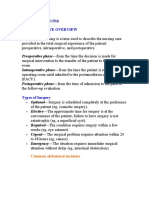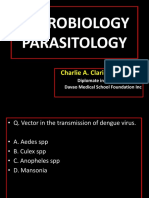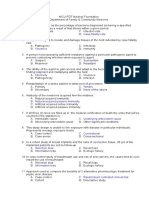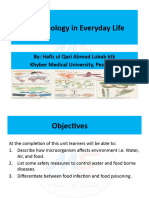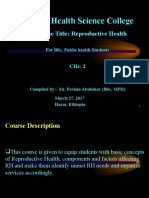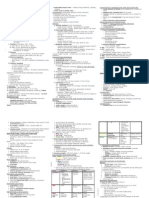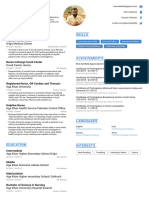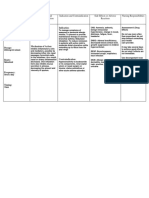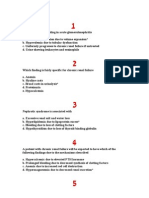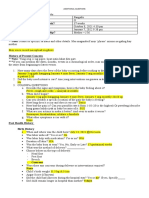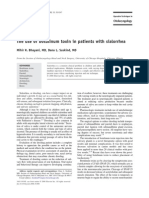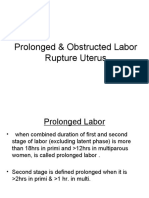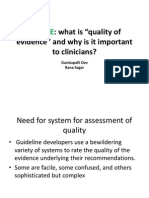Parasitology Lecture Reviewer
Parasitology Lecture Reviewer
Uploaded by
Sam BrilloCopyright:
Available Formats
Parasitology Lecture Reviewer
Parasitology Lecture Reviewer
Uploaded by
Sam BrilloOriginal Description:
Copyright
Available Formats
Share this document
Did you find this document useful?
Is this content inappropriate?
Copyright:
Available Formats
Parasitology Lecture Reviewer
Parasitology Lecture Reviewer
Uploaded by
Sam BrilloCopyright:
Available Formats
I.
II.
III.
IV.
V.
VI.
VII.
Intro to Parasitology
Systematics of Nematodes
Soil transmitted helminthes (sth)
Intestinal nematodes of human beings
E. vermicularis
Food borne parasites
Vector borne parasites
Introduction to Parasitology
1.) Branch of biology that deals with
parasites which are physiologically
dependent on their hosts for survival.
2.) Parasitism is: (almost, always, almost
always) obligatory.
3.) According to WHO, what are the 6 priority
diseases?
4.) Leprosy is caused by a (parasite,
bacterium)
5.) Leishmaniasis is caused by?
6.) 2 types of trypanosomiasis.
7.) Filariasis is caused by (nematode,
platyhelminth)
8.) Schistosomiasis is caused by?
9.) Malaria is caused by a plasmodium, which
is an?
PREVALENCE RATE
10.) Amoebiasis: 10%, 20%, 30%
11.) Malaria: 2-6 million, 4-10 million, 8-10
million
12.) Trichuriasis: 500-800 million, 600-900
million, 400-600 million
13.) Ascariasis: 1 billion, 1.5 billion, 2
billion
TYPES OF PARASITES
14.) According to location on host
a.) Infection:
b.) Infestation:
15.) Head louse is an example of an (ecto,
endo) parasite.
16.) Infection and infestation are terms for
(condition, status).
17.) Mdiasis is caused by an (ecto, endo)
parasite.
18.) Mdiasis occurs in (oral tissue, throat
tissue)
19.) Which is more difficult to cure,
infection or infestation?
20.) Term for a disease that is caused by a
parasite.
21.) When signs and symptoms are
present.
22.) According to taxonomic group
a.) Protozoa
Phylum
Phylum
Phylum
b.) Helminths
Phylum
Phylum
c.) Arthropods:
Means ____-footed.
Most arthropods are (ecto, endo)
parasites.
23.) According to the degree of association
with host.
a.) Obligatory
Obligatory parasites are: endo,
ecto?
Obligatory parasites (can,
cannot) exist without the host
Example of an obligatory
parasite:
b.) Facultative or _________
Example of a facultative
parasite that is a free-living. It is
a parasite if it is subjected
under a harsh condition:
c.) Permanent
d.) Temporary or _________
Example of a temporary
parasite. (clue: they are
arthropods)
e.) Accidental or __________
Example of accidental parasite
of human.
f.) Aberrant
Aberrant parasites are very
_________.
They can ______ to other parts
of the body.
g.) Spurious or __________
Ingestion of a spurious parasite
can pass through the digestive
tract without infecting the host.
TRUE or FALSE?
h.) Hyperparasite
Plasmodium is an example of a
hyperparasite. This parasite
brings what disease?
Plasmodium is carried by what
vector?
Is that vector an arthropod?
Is that vector an (ecto, endo)
parasite?
Plasmodium is then, a parasite
of other parasite. TRUE or
FALSE?
Describe the ovum of
plasmodium. Is it
unembryonated?
i.) Pseudoparasite
Cite examples of
pseudoparasite.
24.) According to host specificity.
a.) Parasites with preference for human
host.
b.) Parasites with preference for animal
host.
c.) Animal parasites that can be
transmitted to humans.
d.) Parasite is common in man and
reservoir.
e.) Man is an incidental host.
f.) Parasites that are primarily of animal
origin but can be transmitted to
humans.
g.) Parasites that are primarily of human
origin but can be transmitted to other
vertebrates
ADDITIONAL QUESTIONS ABOUT HOST
SPECIFICITY.
Tell the type of parasite according to host
specificity
1. Anopheles gambiensis
2. Anopheles flavirostris
3. Schistosoma
4. Ancylostoma caninum
5. Balantidium coli
6. Entamoeba histolytica
FACTORS AFFECTING A DISEASE
25.) Capacity of the parasite to harm the
host.
26.) Actual number of parasite within the
host is the?
27.) List down 3 host factors
a.)
b.)
c.)
TYPES OF HOSTS
28.) Definitive host:
29.) Intermediate host:
30.) Reservoir host:
31.) Paratenic, refrigerator or transport
host:
32.) Accidental or incidental host:
33.) Fomites:
34.) Dead end host:
35.) Vectors:
a.) __________ or mechanical
b.) ___________ vector
ADDITIONAL QUESTIONS:
1. In S. japonicum, the infective stage is?
2. The infective host?
3. The definitive host?
4. The refrigerator host?
LIFE CYCLE
36.) 1 host:
37.) 2 or more hosts:
You might also like
- PROSTATE CANCER - Charlene Boehm DNA Frequencies - The Rife ForumDocument2 pagesPROSTATE CANCER - Charlene Boehm DNA Frequencies - The Rife Forumpaulxe100% (3)
- Mariano - CD Od FormDocument2 pagesMariano - CD Od FormMarionne MarianoNo ratings yet
- Microbiology MCQS: BacteriaDocument13 pagesMicrobiology MCQS: BacteriaIqbal HussainNo ratings yet
- Parasitology QuizDocument15 pagesParasitology Quizkaram Barakat50% (2)
- Unit 1Document49 pagesUnit 1EyamgualeleNo ratings yet
- Medical Parasitology: "TheDocument35 pagesMedical Parasitology: "Therodelagapito100% (2)
- MC Question Bank For Quiz 2Document11 pagesMC Question Bank For Quiz 2necrodamien100% (1)
- Chapter Test NUR 124 Health Assessment Midyear 2020Document5 pagesChapter Test NUR 124 Health Assessment Midyear 2020Steve EstebanNo ratings yet
- JFSM, Microboard Mpl'05Document14 pagesJFSM, Microboard Mpl'05Mar Kristian Vero LumenNo ratings yet
- 4.3. Blood and Tissue NematodesDocument89 pages4.3. Blood and Tissue NematodesRediat Gossaye100% (1)
- Questions and Answers PDFDocument8 pagesQuestions and Answers PDFYousefM.R.AlmassriNo ratings yet
- Part 2 Tests PDFDocument94 pagesPart 2 Tests PDFSardar jiNo ratings yet
- Surgey MCQSDocument95 pagesSurgey MCQSZain HadiNo ratings yet
- Medical ProtozoologyDocument6 pagesMedical ProtozoologyRaymund MontoyaNo ratings yet
- Micro paraDocument7 pagesMicro paraAj MillanNo ratings yet
- 5 - Ethics in DentistryDocument30 pages5 - Ethics in DentistryDr. Siddana GoudNo ratings yet
- The Health History and Interviewing Process 2Document25 pagesThe Health History and Interviewing Process 2Mitul PeterNo ratings yet
- Helm in TH OlogyDocument42 pagesHelm in TH OlogyNiaz Asghar75% (4)
- Microbiology and ParasitologyDocument59 pagesMicrobiology and ParasitologyJade BuriNo ratings yet
- Withholding and Withdrawing Life SupportDocument3 pagesWithholding and Withdrawing Life SupportNURSETOPNOTCHERNo ratings yet
- Tetanus, Botulisn, Gas GangreneDocument87 pagesTetanus, Botulisn, Gas GangreneTarik100% (1)
- Pathology Cases 6Document21 pagesPathology Cases 6infobusiness2010No ratings yet
- Bioethics Final Exam Practice QuestionsDocument9 pagesBioethics Final Exam Practice QuestionsJhayne100% (1)
- Exam MCQ عين شمس + AnswersDocument118 pagesExam MCQ عين شمس + AnswersIsmail Ahmed50% (2)
- Take Home Quiz CDMDocument3 pagesTake Home Quiz CDMapi-19786361No ratings yet
- Legal Medicine - AsphyxiaDocument39 pagesLegal Medicine - Asphyxiawhisper13941100% (1)
- Levanthan Short Ans KeyDocument42 pagesLevanthan Short Ans Keyxyab.varga.swuNo ratings yet
- Perioperative NursingDocument88 pagesPerioperative Nursingdaljit chahalNo ratings yet
- Answer Key To CellsDocument1 pageAnswer Key To CellsKaye CorNo ratings yet
- Microbiology Mock Board RationalizationDocument228 pagesMicrobiology Mock Board RationalizationCla NuvalNo ratings yet
- Parasitology Lec 3.01a Intestinal NematodesDocument16 pagesParasitology Lec 3.01a Intestinal NematodesEnaWahahaNo ratings yet
- Giardia PPT M.SC Medical 4th SemDocument16 pagesGiardia PPT M.SC Medical 4th SemRahul ChaudharyNo ratings yet
- Set 3Document22 pagesSet 3Alyssa MontimorNo ratings yet
- Questions and Answers To Assignment 1Document4 pagesQuestions and Answers To Assignment 1Jhomer CabasNo ratings yet
- Community Health Nursing Notes Year One General Nursing in PakistanDocument62 pagesCommunity Health Nursing Notes Year One General Nursing in PakistanBheru Lal100% (2)
- Introduction To NutritionDocument29 pagesIntroduction To NutritionBerhe Gebremichael HailuNo ratings yet
- Preventive MedicineDocument10 pagesPreventive MedicineHuji JalamiNo ratings yet
- CPHM TransesDocument5 pagesCPHM TransesElizer Robles Jr.No ratings yet
- Medical Parasitology in The Philippines (Belizario, de Leon) - Pages-307-340Document34 pagesMedical Parasitology in The Philippines (Belizario, de Leon) - Pages-307-340Mae Rose Charlene MendozaNo ratings yet
- Course Syllabus - CPH LabDocument2 pagesCourse Syllabus - CPH LabTom Anthony Tonguia100% (1)
- Microbiology in Everyday Life.Document32 pagesMicrobiology in Everyday Life.sa72562624742No ratings yet
- Prelims Micropara LecDocument14 pagesPrelims Micropara LecBSN1F- JACILDO, KUH KYLA C.No ratings yet
- Mental Health Ordinance 2001: Assessment and TreatmentDocument20 pagesMental Health Ordinance 2001: Assessment and TreatmentSajjad Ali100% (1)
- Uptake of Hepatitis B Vaccination...Document101 pagesUptake of Hepatitis B Vaccination...KhalidTaherAl-HussainiNo ratings yet
- Musculoskeletal MCQDocument12 pagesMusculoskeletal MCQVallesh ShettyNo ratings yet
- (EPI) 2.06 Community Diagnosis - DR - ZuluetaDocument4 pages(EPI) 2.06 Community Diagnosis - DR - ZuluetapasambalyrradjohndarNo ratings yet
- MICRO Lecture 1 Introduction To Microbiology and Parasitology 1 PDFDocument29 pagesMICRO Lecture 1 Introduction To Microbiology and Parasitology 1 PDFJireh AcabalNo ratings yet
- Pediatric Sample ExamDocument5 pagesPediatric Sample ExamRho Vince Caño MalagueñoNo ratings yet
- Introduction To MicrobiologyDocument55 pagesIntroduction To MicrobiologyAngelica Valdez BalmesNo ratings yet
- Chapter 1: MicrobiologyDocument18 pagesChapter 1: MicrobiologyShanz HadjirulNo ratings yet
- Chapter 05. Normal Flora of The Human BodyDocument16 pagesChapter 05. Normal Flora of The Human BodyChino Isiah CañeteNo ratings yet
- Health Care ProviderDocument3 pagesHealth Care ProviderMayet De Castro LejanoNo ratings yet
- Microbiology QuestionsDocument6 pagesMicrobiology Questionsburhaninho0% (1)
- MC 1 HUMAN ANATOMY AND PHYSIOLOGY MidtermDocument12 pagesMC 1 HUMAN ANATOMY AND PHYSIOLOGY MidtermNicole Sheen EnriquezNo ratings yet
- Lecture 1Document36 pagesLecture 1Behar AbdurahemanNo ratings yet
- IMCI (Integrated Management of Childhood Illness)Document4 pagesIMCI (Integrated Management of Childhood Illness)Jane BautistaNo ratings yet
- Infection and Host ResistanceDocument9 pagesInfection and Host ResistanceDaren GocoNo ratings yet
- Microbiology and Parasitology Laboratory Activity No.1Document8 pagesMicrobiology and Parasitology Laboratory Activity No.1Eloisa BrailleNo ratings yet
- CC Blood CollectionDocument3 pagesCC Blood Collectionlcrujido100% (1)
- The politics of hunger: Protest, poverty and policy in England, <i>c.</i> 1750–<i>c.</i> 1840From EverandThe politics of hunger: Protest, poverty and policy in England, <i>c.</i> 1750–<i>c.</i> 1840No ratings yet
- 1 Introduction To Medical ParasitologyDocument63 pages1 Introduction To Medical ParasitologyeltorhemaNo ratings yet
- Gender Issues On Philippine Economic Setting: A Reflective EssayDocument5 pagesGender Issues On Philippine Economic Setting: A Reflective EssaySam BrilloNo ratings yet
- Cabalza Dennis VDocument44 pagesCabalza Dennis VSam BrilloNo ratings yet
- Mitosis: Samuel C. BrilloDocument20 pagesMitosis: Samuel C. BrilloSam BrilloNo ratings yet
- SEAFDEC Practicum ReportDocument23 pagesSEAFDEC Practicum ReportSam BrilloNo ratings yet
- Resume Karim DadDocument1 pageResume Karim DadMisbhasaeedaNo ratings yet
- Or Case Slips - 2022Document1 pageOr Case Slips - 2022KRISTOBAL PALEYANNo ratings yet
- BudesonideDocument2 pagesBudesonideKristine YoungNo ratings yet
- Intravenous TherapyDocument31 pagesIntravenous TherapyChong Uy AlawiNo ratings yet
- Nutrition Care Plan: Assessment Diagnosis Intervention Rationale Monitoring EvaluateDocument1 pageNutrition Care Plan: Assessment Diagnosis Intervention Rationale Monitoring EvaluateLarr SumalpongNo ratings yet
- ERAS Protocols For Thyroid andDocument9 pagesERAS Protocols For Thyroid andOskar MartinezNo ratings yet
- High Yield PediatricsDocument78 pagesHigh Yield Pediatricsjose100% (1)
- CTCAE 4.03 2010-06-14 QuickReference 5x7Document196 pagesCTCAE 4.03 2010-06-14 QuickReference 5x7Andreea ZaharieNo ratings yet
- Grade 6 Sample Lesson Plan: Unit 7 - Diseases: DescriptionDocument9 pagesGrade 6 Sample Lesson Plan: Unit 7 - Diseases: DescriptionNicole RainNo ratings yet
- Sexual HygieneDocument32 pagesSexual Hygienethea medinaNo ratings yet
- Preoperative Evaluation and Preparation of The Gynecologic Patient - GLOWMDocument13 pagesPreoperative Evaluation and Preparation of The Gynecologic Patient - GLOWMshaliniNo ratings yet
- MCQ1Document11 pagesMCQ1Yuda Lutfiadi100% (1)
- Additional Questions Case Study FinalsDocument7 pagesAdditional Questions Case Study FinalsMia Grace GarciaNo ratings yet
- Radiopharmaceutical (Sm-153-EDTMP) Therapy of Skeletal Metastases: Clinical Application in 350 PatientsDocument9 pagesRadiopharmaceutical (Sm-153-EDTMP) Therapy of Skeletal Metastases: Clinical Application in 350 Patientsafifah nurul izzahNo ratings yet
- Sialoree BotoxDocument5 pagesSialoree BotoxJocul DivinNo ratings yet
- MHC (Major Histocompatibility Complex)Document19 pagesMHC (Major Histocompatibility Complex)Kayshu Grover100% (2)
- 0803616686Document1,132 pages0803616686Nuno Freitas Bastos100% (9)
- Chronic TympanomastoiditisDocument25 pagesChronic Tympanomastoiditispatriciaberedo100% (1)
- Digestive-System-Grade - 8-Science-2023Document33 pagesDigestive-System-Grade - 8-Science-2023Jonairah PanomblayanNo ratings yet
- 15-Bed-Hospital PH B1Document10 pages15-Bed-Hospital PH B1Sunil Kumar BhagatNo ratings yet
- 105 DRUGS SOPs FOR YSR CLINICSDocument17 pages105 DRUGS SOPs FOR YSR CLINICSrajuNo ratings yet
- Prolonged & Obstructed Labor Rupture UterusDocument30 pagesProlonged & Obstructed Labor Rupture UterusIndri Heni DamanikNo ratings yet
- Grade:: What Is "Quality of Evidence" and Why Is It Important To Clinicians?Document12 pagesGrade:: What Is "Quality of Evidence" and Why Is It Important To Clinicians?Deva GundupalliNo ratings yet
- Case Study - Repeat LtcsDocument9 pagesCase Study - Repeat LtcsAnna SantosNo ratings yet
- Mpce 011 PDFDocument9 pagesMpce 011 PDFsufiya shaikhNo ratings yet
- Auricular Acupuncture at The Shenmen'' and Point Zero'' Points Induced Parasympathetic ActivationDocument5 pagesAuricular Acupuncture at The Shenmen'' and Point Zero'' Points Induced Parasympathetic Activationraspino1959No ratings yet
- Hiv and Aids BrochureDocument2 pagesHiv and Aids Brochureapi-546485128No ratings yet
- The Future of Cystic Fibrosis Treatment From DiseDocument14 pagesThe Future of Cystic Fibrosis Treatment From DiseAlexander LozaNo ratings yet



























